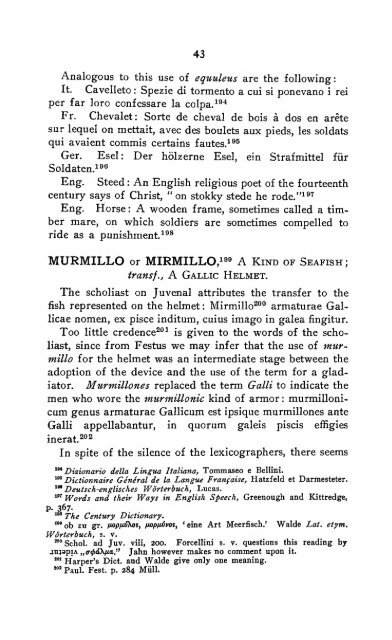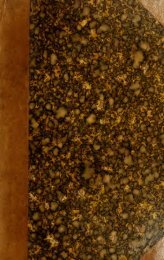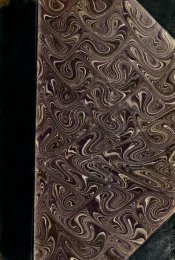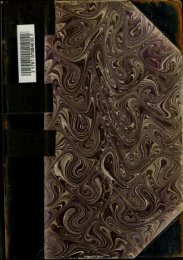Figurative uses of animal names in Latin and their ... - mura di tutti
Figurative uses of animal names in Latin and their ... - mura di tutti
Figurative uses of animal names in Latin and their ... - mura di tutti
You also want an ePaper? Increase the reach of your titles
YUMPU automatically turns print PDFs into web optimized ePapers that Google loves.
43<br />
Analogous to this use <strong>of</strong> equuleus are the follow<strong>in</strong>g:<br />
It. Cavelleto : Spezie <strong>di</strong> tormento a cui si ponevano i rei<br />
per far loro confessare la colpa.^^*<br />
Fr. Chevalet: Sorte de cheval de bois a dos en arete<br />
sur lequel on mettait, avec des boulets aux pieds, les soldats<br />
qui avaient commis certa<strong>in</strong>s fautes.-*®^<br />
Ger. Esel: Der holzerne Esel, e<strong>in</strong> Strafmittel ftir<br />
Soldaten.i»«<br />
Eng. Steed : An English religious poet <strong>of</strong> the fourteenth<br />
century says <strong>of</strong> Christ, "on stokky stede he rode.""''<br />
Eng. Horse : A wooden frame, sometimes called a timber<br />
mare, on which sol<strong>di</strong>ers are sometimes compelled to<br />
ride as a punishment.^®*<br />
MURMILLO or MIRMILLO,!®® A K<strong>in</strong>d <strong>of</strong> Seafish;<br />
transf., A Gallic Helmet.<br />
The scholiast on Juvenal attributes the transfer to the<br />
fish represented on the helmet : Mirmillo^*"* armaturae Gal-<br />
licae nomen, ex pisce <strong>in</strong><strong>di</strong>tum, cuius imago <strong>in</strong> galea f<strong>in</strong>gitur.<br />
Too little credence^"* is given to the words <strong>of</strong> the scholiast,<br />
s<strong>in</strong>ce from Festus we may <strong>in</strong>fer that the use <strong>of</strong> mur-<br />
millo for the helmet was an <strong>in</strong>terme<strong>di</strong>ate stage between the<br />
adoption <strong>of</strong> the device <strong>and</strong> the use <strong>of</strong> the term for a glad-<br />
iator. Murmillones replaced the term Galli to <strong>in</strong><strong>di</strong>cate the<br />
men who wore the murmillonic k<strong>in</strong>d <strong>of</strong> armor : murmillonicum<br />
genus armaturae Gallicum est ipsique murmillones ante<br />
Galli appellabantur, <strong>in</strong> quorum galeis piscis effigies<br />
<strong>in</strong>erat.2»2<br />
In spite <strong>of</strong> the silence <strong>of</strong> the lexicographers, there seems<br />
''* Dizionario delta L<strong>in</strong>gua Italiana, Tommaseo e Bell<strong>in</strong>i.<br />
"" Dictionnaire Geniral de la Langue Fratifaise, Hatzfeld et Darmesteter.<br />
"" Deutsch-englisches Worterbuch, Lucas.<br />
*" Words <strong>and</strong> <strong>their</strong> Ways <strong>in</strong> English Speech, Greenough <strong>and</strong> Kittredge,<br />
p. 367-<br />
"* The Century Dictionary.<br />
'"ob zu gr. iMp/eSKos, impiiivas, 'e<strong>in</strong>e Art Meerfisch.' Walde Lat. etym.<br />
Worterbuch, s. v.<br />
"" Schol. ad Juv. viii, 200. Forcell<strong>in</strong>i s. v. questions this read<strong>in</strong>g by<br />
jn}3pTA„(r0(iX/ta." Jahn however makes no comment upon it.<br />
'" Harper's Diet, <strong>and</strong> Walde give only one mean<strong>in</strong>g.<br />
'"" Paul. Fest. p. 284 Miill.



![Das Kriegswesen der Alten [microform] - mura di tutti](https://img.yumpu.com/21606999/1/167x260/das-kriegswesen-der-alten-microform-mura-di-tutti.jpg?quality=85)








